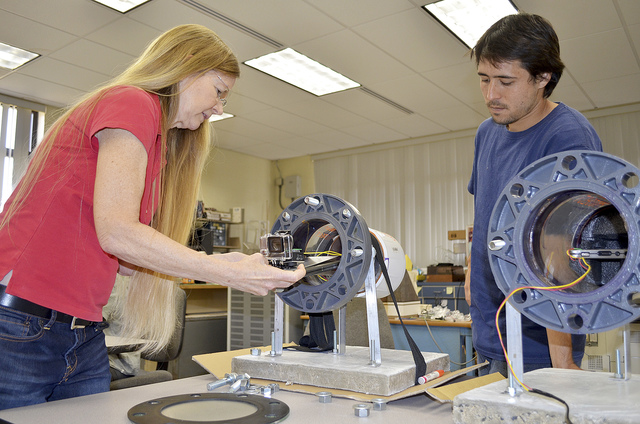By CHRIS D’ANGELO
The Garden Island
LIHUE, Kauai — Smile, snorkelers. You may soon be on camera.
Kauai’s South Shore will become a miniature underwater video observatory, offering a fish-eye-view of coral, marine life — and a possible swimmer or two — in a grant-funded pilot project geared to help students learn more about the underwater world.
“The No. 1 goal is to basically introduce younger students, junior high and high school students, to the scientific process, and we’re using the ocean and marine biology to do it,” said Serge Marcil, a part-time digital media arts instructor at Kauai Community College.
Marcil and Georgeanne Purvinis, an instructor of engineering and electronics at the school, were recently awarded a $15,000 grant from the National Oceanic and Atmospheric Administration to carry out the pilot project. The money went toward the purchase of a pair of GoPro cameras, which have been hacked and outfitted with motion sensors.
Marcil said the system will be similar to game cameras, which turn on when a critter swims into the frame.
But the system has also been programmed to snap a photo every five minutes for eight hours per day — a total of 2,880 photos over a three-week period — which will document changes in sediment, fish counts and more. One camera is also set up to shoot video.
Some students said they don’t know what to expect from the high-tech trial project.
Natalie Baus, who is enrolled in the college’s marine option program, is working on a project to develop turtle facial recognition software, for example. What the results will look like, however, is anyone’s guess.
“I’m not really sure what kind of data we’re going to get out of it. I’m not sure what we’re going to see,” said Marcus Yamaguchi, a KCC student who designed the mechanical hardware and motion sensors for the observatories. “Definitely, I would like to develop the capability of our observatories over time, maybe incorporate different types of sensors, either temperature, pH.”
In addition to collecting long-term observational and research data about reef, fish and marine mammal health, the project will engage students in marine-related training and research and enable the production of video to be shown at schools around Kauai.
Ruth McDowell, a lecturer in marine biology at KCC, said she’s looking forward to getting the devices in the water.
“We just need to find out what it can do, what it’s good at,” she said.
Katie Nalesere, education specialist for the Department of Land and Natural Resources’ Division of Aquatic Resources, voiced her support for the project as it gets youth at several levels involved in natural resource management and investigating challenges.
“Another strength of this project is that it is cross-disciplinary and during the design process everybody brought something to the table,” she wrote in an email. “Going forward in management we will need this kind of approach to effectively tackle the challenges facing our natural resources.”
Nalesere added that she expects the underwater observatory will be a useful tool for scientists to utilize in future studies.
Marcil plans to include some footage in “Saving Lives,” a reality TV series he is producing about the Kauai Junior Lifeguard program.
“This is just round one of what we’re kind of hoping to achieve, and then we’ll experiment with it later,” he said.






